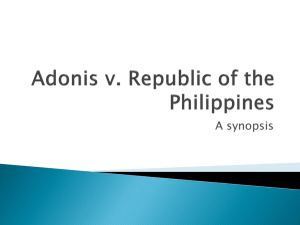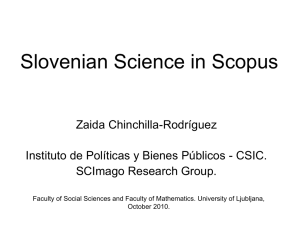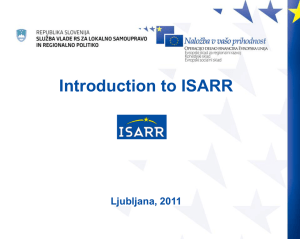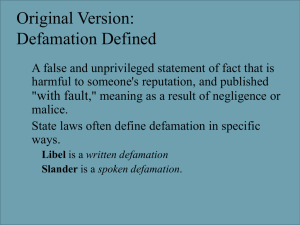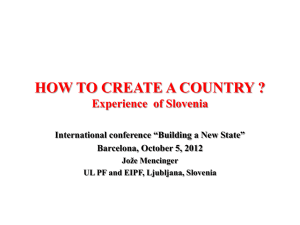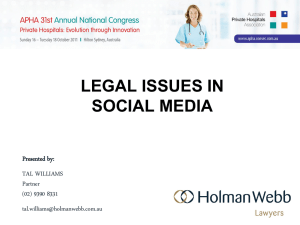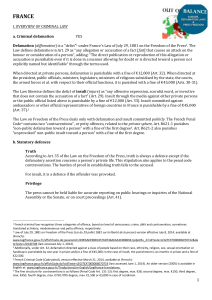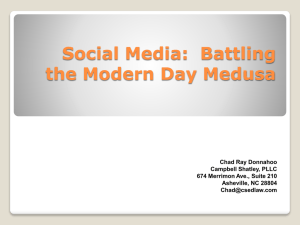Slovenia-SHARE - International Press Institute
advertisement
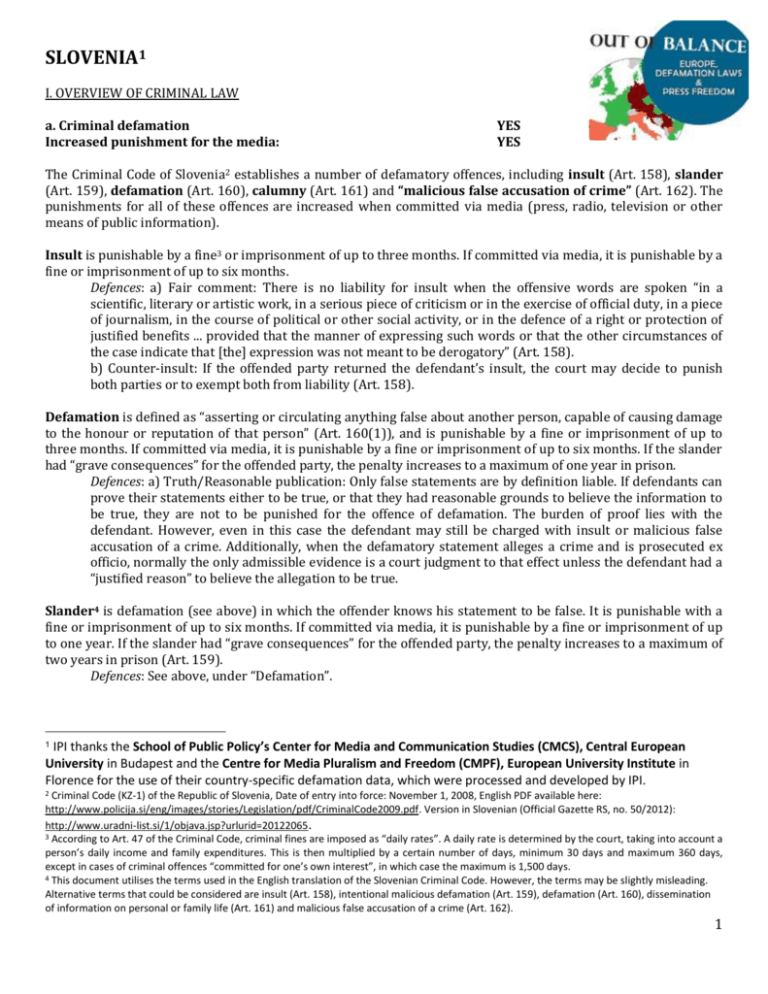
SLOVENIA1
I. OVERVIEW OF CRIMINAL LAW
a. Criminal defamation
Increased punishment for the media:
YES
YES
The Criminal Code of Slovenia2 establishes a number of defamatory offences, including insult (Art. 158), slander
(Art. 159), defamation (Art. 160), calumny (Art. 161) and “malicious false accusation of crime” (Art. 162). The
punishments for all of these offences are increased when committed via media (press, radio, television or other
means of public information).
Insult is punishable by a fine3 or imprisonment of up to three months. If committed via media, it is punishable by a
fine or imprisonment of up to six months.
Defences: a) Fair comment: There is no liability for insult when the offensive words are spoken “in a
scientific, literary or artistic work, in a serious piece of criticism or in the exercise of official duty, in a piece
of journalism, in the course of political or other social activity, or in the defence of a right or protection of
justified benefits ... provided that the manner of expressing such words or that the other circumstances of
the case indicate that [the] expression was not meant to be derogatory” (Art. 158).
b) Counter-insult: If the offended party returned the defendant’s insult, the court may decide to punish
both parties or to exempt both from liability (Art. 158).
Defamation is defined as “asserting or circulating anything false about another person, capable of causing damage
to the honour or reputation of that person” (Art. 160(1)), and is punishable by a fine or imprisonment of up to
three months. If committed via media, it is punishable by a fine or imprisonment of up to six months. If the slander
had “grave consequences” for the offended party, the penalty increases to a maximum of one year in prison.
Defences: a) Truth/Reasonable publication: Only false statements are by definition liable. If defendants can
prove their statements either to be true, or that they had reasonable grounds to believe the information to
be true, they are not to be punished for the offence of defamation. The burden of proof lies with the
defendant. However, even in this case the defendant may still be charged with insult or malicious false
accusation of a crime. Additionally, when the defamatory statement alleges a crime and is prosecuted ex
officio, normally the only admissible evidence is a court judgment to that effect unless the defendant had a
“justified reason” to believe the allegation to be true.
Slander4 is defamation (see above) in which the offender knows his statement to be false. It is punishable with a
fine or imprisonment of up to six months. If committed via media, it is punishable by a fine or imprisonment of up
to one year. If the slander had “grave consequences” for the offended party, the penalty increases to a maximum of
two years in prison (Art. 159).
Defences: See above, under “Defamation”.
IPI thanks the School of Public Policy’s Center for Media and Communication Studies (CMCS), Central European
University in Budapest and the Centre for Media Pluralism and Freedom (CMPF), European University Institute in
Florence for the use of their country-specific defamation data, which were processed and developed by IPI.
1
2
Criminal Code (KZ-1) of the Republic of Slovenia, Date of entry into force: November 1, 2008, English PDF available here:
http://www.policija.si/eng/images/stories/Legislation/pdf/CriminalCode2009.pdf. Version in Slovenian (Official Gazette RS, no. 50/2012):
http://www.uradni-list.si/1/objava.jsp?urlurid=20122065.
3 According to Art. 47 of the Criminal Code, criminal fines are imposed as “daily rates”. A daily rate is determined by the court, taking into account a
person’s daily income and family expenditures. This is then multiplied by a certain number of days, minimum 30 days and maximum 360 days,
except in cases of criminal offences “committed for one’s own interest”, in which case the maximum is 1,500 days.
4 This document utilises the terms used in the English translation of the Slovenian Criminal Code. However, the terms may be slightly misleading.
Alternative terms that could be considered are insult (Art. 158), intentional malicious defamation (Art. 159), defamation (Art. 160), dissemination
of information on personal or family life (Art. 161) and malicious false accusation of a crime (Art. 162).
1
Calumny is defined as “assert[ing] or circulat[ing] any matter concerning personal or family affairs of another
person, which is capable of injuring that person’s honour and reputation” [emphasis added]. It is punishable by a
fine or imprisonment of up to three months. If committed via media, it is punishable by a fine or imprisonment of
up to six months). If, by its nature, it may result in “grave consequences”, the penalty increases to a maximum of
one year in prison. Even true statements are punishable as calumny, except where the defence of “reasonable
publication” is available (see below) (Art. 161(4)).
Defences: a) Reasonable publication: There is no punishment when the defendant committed calumny “in
the exercise of official duty, political or other social activity, the defence of a right or the protection of
justified benefits ... provided that [the defendant] proves either the truth of his assertions or that he had
reasonable grounds for believing in the truthfulness of what has been asserted or circulated” (Art. 161(5)).
Malicious false accusation of crime is an act of calumny in which the assertion consists of falsely accusing
someone of a crime “with the intention of exposing that person to scorn”. The penalty is a fine or imprisonment of
up to three months. If committed via media, it is punishable by a fine or imprisonment of up to six months
b. Statutory defences
Truth
See above under “Defamation”, “Slander” and “Calumny”.
Reasonable publication
See above under “Defamation”, “Slander” and “Calumny”.
Honest opinion (fair comment)
See above under “Insult”.
Privilege
Other notable defences:
Art. 167 provides that a court may remit punishment for a violation of Arts. 158-162 or Art. 166 (see
“Liability for the press”, below) if the perpetrator of the offence was provoked by the indecent or brutal
conduct of the damaged party, or if the perpetrator offers an apology before the court or similarly retracts
what he had been asserting or circulating.
c. Provisions protecting honour of public officials
Punishments increase when offences are directed at the president. See “Protection for the state”, below.
d. Provisions protecting the state, its institutions or its symbols
Art. 163(1) provides that committing the offence of insult, slander, defamation, calumny or malicious false
accusation of crime (respectively, Arts. 158-162) against the Republic of Slovenia – or against the president in the
exercise of his duties – is punishable by a fine or imprisonment of up to one year. The same punishment applies to
anyone who publicly desecrates the flag, coat-of arms or national anthem of the Republic of Slovenia (Art. 163(2)).
e. Provisions protecting for foreign officials, states, and symbols
Art. 164(1) provides that committing any of the offences set forth in Arts. 158-162 against a foreign country, its
head of state or its diplomatic ambassador, or desecrating the flag, coat of arms or national anthem of a foreign
country, is punishable by a fine or imprisonment of up to one year. Defaming an international organisation
recognised by the Republic of Slovenia, or that organisation’s representative or insignia, is similarly punishable
(Art. 164(2)).
2
f. Provisions protecting religious feeling or religious symbols5
No such provisions found
g. Provisions protecting the deceased
If an offence set forth in Arts. 158-162 is committed against a deceased person, Art. 168(4) provides that the
person’s spouse, extra-marital partner, partner from a registered same-sex civil partnership, children or adopted
children, parents or adoptive parents, or brothers or sisters can initiate prosecution.
h. Additional criminal laws affecting rights to honour and dignity
Art. 165 punishes “insult”, “slander” or “defamation” (Arts. 158-160) against “the Slovenian people” or the
Hungarian, Italian and Roma minorities living in the Republic of Slovenia with a fine or imprisonment of up to one
year.
Where a court convicts someone under Arts. 158-165 for a violation that occurred through radio, television or
other public media, Art. 169 allows the injured person to ask the court to order the offender to pay for the
judgment to be published in the same manner in which the offence was committed.
i. Criminal procedure
Art. 168(1) provides that prosecution of any of the offences set forth in Arts. 158-162 is to be initiated by a private
action. If the offence is committed against a state, municipal or provincial authority, or against official or military
persons in relation to the exercise of their office, prosecution is to be initiated upon a complaint (Art. 168(2)). If the
offence is committed against a foreign country (see “Protection for foreign officials”, above), prosecution requires
permission of Slovenia’s justice minister (Art. 168(3)). See, also, “Protection for the dead”, above.
j. Liability for the media
Art. 166 prescribes the liability of editors, publishers and printers in connection with criminal offences under Arts
158-165. The responsible editor, or someone acting in his place, faces criminal punishment if the offence was
committed by public notice of acts in newspapers and magazines, radio and television programmes, electronic
publications, on teletext or in other forms of daily or periodical publications, or on websites (Art. 166(1)).
However, liability does not attach where the offence came in relation to a live broadcast and the editor could not
have prevented the act at issue. A publisher or printer faces similar punishment if the act was committed in nonperiodical printed publications. So, too, does a manufacturer if the public notice came on a record, CD, DVD, in a
film or by other video, audio or other means intended for a broader circle of people (Art. 166(2)).
II. OVERVIEW OF CIVIL LAW
a. Civil defamation
Slovenia has no specific civil law regulating defamation; rather, civil liability is subject to the provisions of the
Obligations Code6. The Code provides the possibility of both material damage as well as moral damage for the
violation of a person’s rights.
5
For other offences related to religion, see Criminal Code Arts. 311 (disrupting religious ceremonies or acting offensively at a religious ceremony)
and 297 (provoking religious hatred, and mistreating or endangering religious symbols).
6 Obligations Code (Official Gazette RS, no. 83/01 of 25. 10. 2001 and 40/07 of 7. 5. 2007), available in Slovenian: http://www.uradnilist.si/1/objava.jsp?urlurid=20074826. An older, 2001 version of the law is available in English at: http://www.uilsipo.si/fileadmin/upload_folder/zakonodaja/povezano/Obligations-Code_Slovenia_2001.pdf
3
Art. 34 of the Slovenian Constitution7 guarantees the right “to personal dignity and safety”. Art. 35 guarantees a
person’s “physical and mental integrity” and “privacy and personality rights”.
Art. 39 protects freedom of expression and the press and states that, except where provided by law, “everyone has
the right to obtain information of a public nature in which he has a well founded legal interest under law”.
b. Damages
Material and moral damages are possible for violations of the right to dignity and personality. Obligations Code Art.
177(1) provides for the compensation of material damages caused by the dissemination of false information if the
person who disseminated the information knew or should have known that it was false.
Art. 179 provides for compensation for physical or mental distress – independent of any reimbursement of
material damage – that was caused by a violation of honour or reputation if the circumstances of the case,
particularly the level and duration of distress and fear, justify such compensation. This is true even where there
was no material damage.
Art. 178 states that, in the case of violation of a personal right, the court can order the publication of the judgement
or a correction, or order the retraction of any statement by which the violation was committed. The court may also
take any other steps that would achieve the purpose compensation is intended to accomplish.
Art. 183 allows a legal person to obtain monetary compensation for the defamation of reputation or good name,
independent of any reimbursement for material damage, if justified under the circumstances. This is true even
where there was no material damage.
c. Defences available
There are no defences, as such, for civil liability. In past cases, the Slovenian courts have sought to balance the right
to free expression with the right to reputation.8
The Obligations Code provides that a person who disseminated false information about another will not be held
liable for material damages if the person was not aware that the information was false and if he or the recipient
had a genuine interest in the information’s dissemination (Art. 177(2)).
III. RIGHT OF REPLY
a. Statutory right of reply
YES
Slovenia’s Constitution grants individuals, organisations and bodies the right to correct and reply to published
information that damaged their rights or interests (Art. 40).
Chapter 1, Sec. 6 (“Right to correction or reply”) of Slovenia’s Media Act9 contains provisions regarding the
correction of (Arts. 26-41) and the reply to (Arts. 42-44) published information.
Where a report infringes the rights or interests of a person, that person may – within 30 days after the report was
published or within 30 days after the person found out about the report, if, for objective reasons, it was not
possible to learn of it within the initial period – demand that the responsible editor publish a correction free of
7
Constitution of the Republic of Slovenia (Official Gazette RS, nos. 33/91-I, 42/97, 66/2000, 24/03, 69/04, 68/06, and 47/13). Available in English:
http://www.us-rs.si/media/constitution.pdf.
8 Mladina D.D. v. Slovenia, no. 20981/10, ECHR 2014, available at: http://hudoc.echr.coe.int/sites/eng/pages/search.aspx?i=001142424#{"itemid":["001-142424"]}.
9 Media Act (Official Gazette RS, no. 35/01 of 11 5 2001), available in Slovenian: http://www.uradni-list.si/1/content?id=76040. An older version is
available in English at: http://srdf.si/File/predpisi/mass_media_act.doc.
4
charge (Art. 26). The correction must be published without modifications, it must be marked as a correction and it
must contain the name of the affected person and refer to the disputed article or programme (Art. 27).
If the medium is published once a month or in longer intervals, and the request for correction was received at least
14 days before the next publication, then the correction must be published in the next issue or programme (Art.
27). In all other cases, the correction shall be published no later than the subsequent issue or programme. For
electronic publications, the correction must be published within 48 hours after receipt of the demand. In any
medium, within 24 hours after receiving the demand the responsible editor must inform the affected person of any
rejection of the correction or, alternatively, in which issue or programme the correction will be published.
A reply must also be published without any substantive modifications, but the responsible editor may ask the
submitter to abridge the reply (Art. 43). It should be noted that the responsible editor has the right to reject
publication of the reply if it cites “untrue or indemonstrable information or assertions”. However, if the reply only
does so in part, the editor must give the author a chance to withdraw that information from the reply.
Art. 13 of the Slovenian Audiovisual Media Services Act10 guarantees the right to correction and reply in
accordance with the governing media law.
IV. AMENDMENTS, CASE LAW, and APPLICATION
a. Recent legal changes
b. Relevant case law
c. Recent examples of cases involving the media
In 2011, the District Court of Ljubljana ordered Finnish television YLE and journalist Magnus Berglund to
pay damages for libel to former Slovenian Prime Minister Janez Jansa. 11 The case arose from YLE’s 2008
broadcast of an investigative journalism programme, authored by Berglund, alleging that several highranking Slovenian officials, including Jansa, accepted bribes in exchange for signing a €270 million contract
with Finnish defence contractor Patria. Jansa sued YLE and Berglund, initially asking for €1.5 million in
compensation. The District Court concluded that the information in the YLE programme was insufficient to
confirm the allegations against Jansa and awarded him €15,000 in compensation from YLE and Berglund.
The court also ordered former Slovenian Police Commissioner Bojan Potocnik – who claimed in an
interview with Berglund that Jansa had accepted a bribe – to pay €6,500 in damages, and it ordered both
YLE and Potocnik to publicly withdraw their statements on Finnish and Slovenian national television.
Meanwhile, a corruption investigation into Jansa that prosecutors initiated in September 2010 led to a
conviction in 2013 and a two-year prison sentence, which an appeals court upheld in April 2014.12 Also that
month, in a decision that was not yet final at the time this report was written, the Ljubljana District Court
threw out Jansa’s claim against YLE and Berglund following a retrial and ordered Jansa to pay nearly
€28,000 in litigation costs. 13
In 2013, a court found blogger and former Slovenian special forces member Mitja Kunstelj guilty of insult
and defamation and sentenced him to six months in prison over offensive posts on his blog about the
10
Audiovisual Media Services Act (Official Gazette RS, no. 87/2011), unofficial English translation available at: http://www.epra.org/articles/medialegislation#SLOVENIA. Version in Slovenian: http://www.uradni-list.si/1/objava.jsp?urlid=201187&stevilka=3715.
11 See “Former Slovenia PM Wins Libel Claim in Patria Case”, Defense News, 13 Dec. 2011. Available at:
http://www.defensenews.com/article/20111213/DEFSECT02/112130313/Former-Slovenia-PM-Wins-Libel-Claim-Patria-Case
12 See “Slovenian court confirms jail sentence for ex-PM Jansa”, Reuters, 28 Apr. 2014, available at:
http://www.reuters.com/article/2014/04/28/us-slovenia-corruption-idUSBREA3R0UL20140428.
13 See “Janša Loses Lawsuit Against Finnish Reporter”, STA, 8 Apr.2014, available at: http://www.sta.si/en/vest.php?s=a&id=1997628
5
private lives of former journalist Spela Predan and journalist and editor Vinko Vasle.14 The court reportedly
handed Kunstelj the prison sentence after he repeatedly stated that he would not pay compensation and
would continue to post similar entries on his blog. In an earlier proceeding, Kunstelj had been ordered to
pay Predan and Vasle €10,000 in compensation, remove the disputed content from his blog and publish an
apology. The court also had barred Kunstelj from posting the statements about Predan and Vasle again or
referring to them.
14
See Jure Predanic, “Mitja Kunstelj has to go to prison because of blogging”, Delo, 13 May 2013, available at:
http://www.delo.si/novice/kronika/mitja-kunstelj-bo-moral-zaradi-bloganja-v-zapor.html. Also see “Blogger gets six months in prison for
defamation”, Reporters Without Borders, 16 May 201, http://en.rsf.org/slovenia-blogger-gets-six-months-in-jail-16-05-2013,44621.html.
6

